Understanding the Side Effects of Common Hypertension Drugs in Singapore
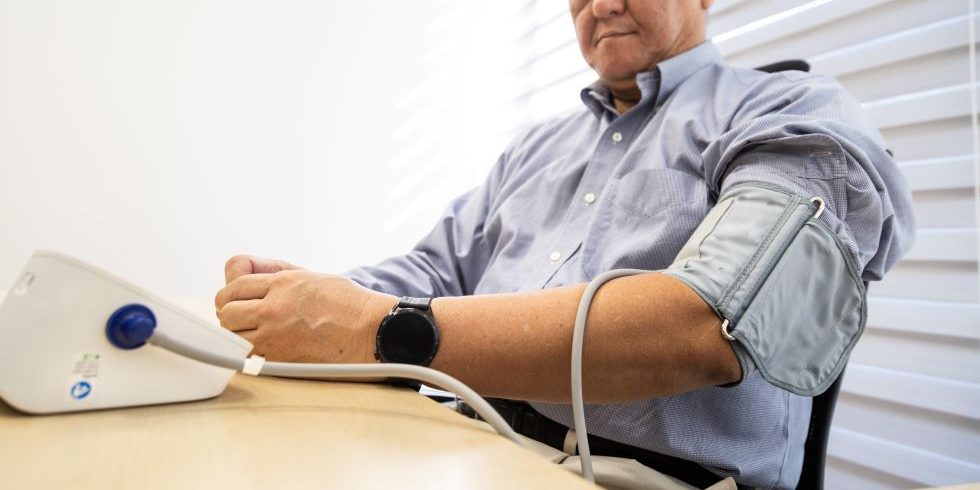
Hypertension, or high blood pressure, is a growing concern not just in Singapore, but worldwide. Left unmanaged, it can lead to serious complications like heart attacks, strokes, and even kidney disease. But the good news is, there are many medications available to help keep it under control. However, as with any medication, high blood pressure drugs may come with side effects.
Side Effects of Hypertension Drugs
In this article, we’ll break down the common side effects of some frequently prescribed high blood pressure medications in Singapore—Exforge, Concor, Twynsta, Micardis, and Norvasc. By understanding these potential side effects, you can make informed decisions with your doctor about what’s best for you.
| Exforge | Concor | Twynsta | Micardis | Norvasc |
| Dizziness Feet/Ankle Swelling Palpitations Fatigue Headaches | Fatigue Cold Hands Slow Heart Rate Sleep Issues Dizziness | Leg Swelling Dizziness Muscle Pain Flushing Nausea | Back Pain Sore Throat Dizziness Diarrhoea | Lower Limb Swelling Dizziness Flushing Gingival Overgrowth Tiredness |
Exforge (Amlodipine/Valsartan)
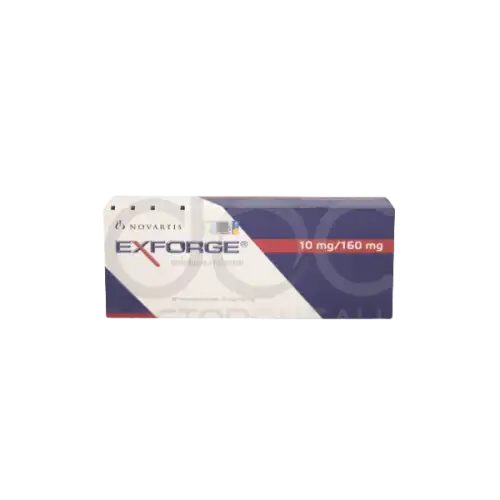
Exforge 10/160mg Tablet 14s (Strip)
SGD $15.58
1902 people have already bought this
Exforge combines two powerful components: amlodipine (a calcium channel blocker) and valsartan (an angiotensin II receptor blocker). Together, they help lower your high blood pressure by relaxing your blood vessels, making it easier for blood to flow12.
Common Side Effects of Exforge:
- Dizziness and Light-headedness
Feeling dizzy, especially when standing up quickly, is quite common. This happens as your high blood pressure reading drops3. - Swelling in the Feet or Ankles
You might notice some swelling, especially in your feet or ankles, due to fluid retention from the amlodipine1. - Palpitations
Your heartbeat may feel irregular at times, but don’t worry—it usually gets better with time3. - Cough or Fatigue
Some people experience a lingering cough or just feel extra tired, although this is less common4. - Headaches
You might get a headache as your body adjusts to the medication, but it should pass soon5.
When to Talk to Your Doctor: If these side effects stick around or get worse, it’s a good idea to check in with your doctor. Sudden swelling, chest pain, or difficulty breathing? Those are signs to seek help immediately.
Concor (Bisoprolol)
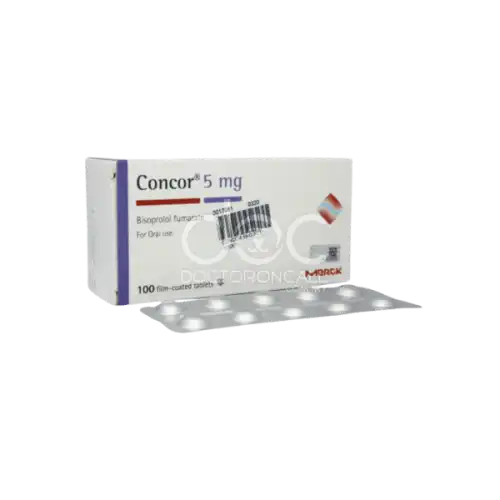
Concor 5mg Tablet 100s (Box)
SGD $54.10
3114 people have already bought this
Concor, which contains bisoprolol, is a beta-blocker. It works by reducing the workload on your heart and relaxing your blood vessels. This makes it easier for your heart to pump blood, lowering your high blood pressure67.
Common Side Effects of Concor:
- Fatigue
Feeling a little more tired than usual is common when starting beta-blockers6. - Cold Hands and Feet
Your extremities might feel chilly due to reduced blood flow1. - Slow Heart Rate (Bradycardia)
While Concor is designed to slow your heart rate, if it slows down too much, it could be an issue4. - Sleep Issues
Some people report trouble sleeping or even nightmares, although this isn’t very common7. - Dizziness or Low Blood Pressure
Feeling light-headed, especially when standing up quickly, is a possible side effect5.
When to Talk to Your Doctor: If you notice your heart rate slowing down too much, or if you’re feeling overly tired or breathless, it’s important to check in with your doctor.
3. Twynsta (Telmisartan/Amlodipine)
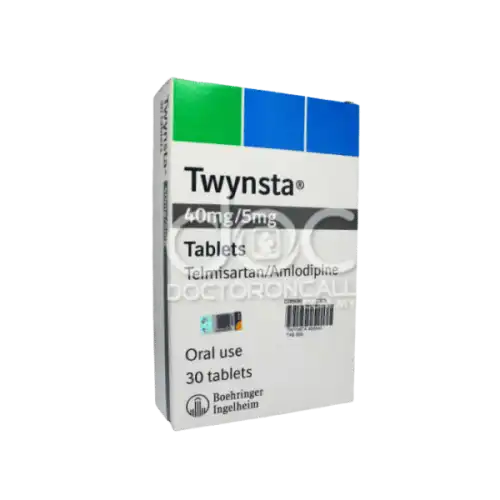
Twynsta 40/5mg Tablet 30s (Box)
SGD $20.46
1789 people have already bought this
Twynsta is a combination of telmisartan (an angiotensin II receptor blocker) and amlodipine (a calcium channel blocker). Together, they work to prevent your blood vessels from narrowing, keeping your high blood pressure in check23.
Common Side Effects of Twynsta:
- Leg or Ankle Swelling
Amlodipine can cause swelling in your legs or ankles—this is one of the most common side effects1. - Dizziness or Fainting
Both components may cause dizziness, especially when you stand up too quickly3. - Muscle Pain or Cramps
Some people experience mild muscle pain or cramps6. - Flushing
You might notice your face feels warm or looks red7. - Nausea and Indigestion
Your stomach might feel a bit upset when you start the medication6.
When to Talk to Your Doctor: If the swelling in your legs gets worse or muscle pain becomes intense, speak to your doctor right away to adjust your dosage.
4. Micardis (Telmisartan)
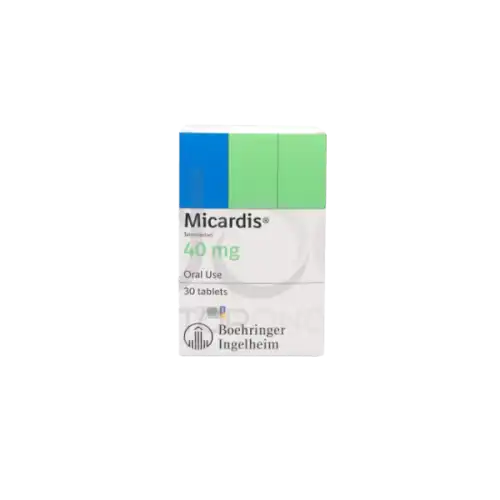
Micardis 40mg Tablet 10s (Strip)
SGD $9.09
2096 people have already bought this
Micardis is often prescribed to those who can’t tolerate other medications, such as ACE inhibitors. It’s an angiotensin II receptor blocker (ARB) that helps relax blood vessels, lowering high blood pressure78.
Common Side Effects of Micardis:
- Back Pain
Some people report occasional back pain after starting Micardis7. - Sinus Congestion or Sore Throat
Mild respiratory symptoms, such as a stuffy nose or sore throat, may occur5. - Dizziness or Light-headedness
You might feel a little dizzy, especially when you stand up quickly, as your high blood pressure reading drops8. - Diarrhoea
While rare, some people experience gastrointestinal issues like diarrhea4.
When to Talk to Your Doctor: If the dizziness or light-headedness persists, or if you experience fainting or trouble breathing, call your doctor for advice.
5. Norvasc (Amlodipine)
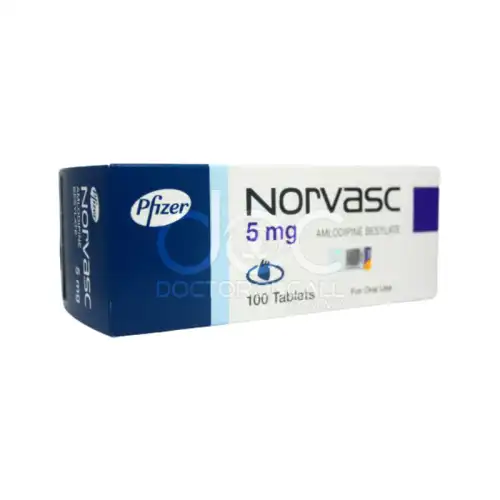
Norvasc 5mg Tablet 10s (Strip)
SGD $5.43
6451 people have already bought this
Norvasc is another calcium channel blocker that helps to relax your blood vessels, making it easier for your heart to pump blood17.
Common Side Effects of Norvasc:
- Swelling of the Lower Limbs
As with other amlodipine-based drugs, swelling in the legs or feet is common1. - Dizziness or Light-headedness
Dizziness can occur, especially when changing positions too quickly3. - Flushing
Some people feel warm or flushed after taking Norvasc7. - Gingival Overgrowth
Although rare, some patients may experience an overgrowth of gum tissue6. - Tiredness
Fatigue can set in as your body adjusts to the medication2.
When to Talk to Your Doctor: Severe swelling, chest pain, or changes in vision are all good reasons to contact your doctor right away.
Conclusion
Managing high blood pressure is essential for long-term health, and medications like Exforge, Concor, Twynsta, Micardis, and Norvasc can play a critical role in keeping your blood pressure under control. While these medications are highly effective, it’s important to remember that side effects may occur.
A healthy lifestyle, including food for high blood pressure and supplements for high blood pressure, can also support your overall treatment. The key is open communication with your healthcare provider—don’t hesitate to bring up any discomfort or side effects you experience. Minor issues often resolve as your body adjusts, but persistent or worsening symptoms should never be ignored.
Every person responds to medication differently, so finding the right treatment for you may take some time and monitoring. With the right plan, you can successfully manage high blood pressure and live a healthy, fulfilling life.
References
- Mayo Clinic. General information on high blood pressure (hypertension) and the effects of medications such as beta-blockers, calcium channel blockers, and ARBs. Available from: [https://tinyurl.com/2d3m6hby]. Accessed on October 25, 2024.
- WebMD. A comprehensive guide to hypertension medications, including detailed side effects of common drugs like Exforge, Concor, Twynsta, Micardis, and Norvasc. Available from: [https://tinyurl.com/3ns2nkkk]. Accessed on October 25, 2024.
- Singapore Ministry of Health (MOH). Local information on hypertension management and common medications prescribed in Singapore. Available from: [https://www.moh.gov.sg/]. Accessed on October 25, 2024.
- Drugs.com. Detailed drug information, including side effects of medications such as Exforge, Concor, Twynsta, Micardis, and Norvasc. Available from: Concor: [https://tinyurl.com/dxu9cjpt], Exforge: [https://tinyurl.com/ypxcc5v3]. Accessed on October 25, 2024.
- National Heart Centre Singapore (NHCS). Information on heart-related treatments, hypertension, and medications used to control blood pressure in Singapore. Available from: [https://tinyurl.com/4rum35af]. Accessed on October 25, 2024.
- American Heart Association (AHA). Global perspectives on high blood pressure and its treatment, including common side effects of antihypertensive drugs. Available from: [https://tinyurl.com/2pn8bcsx]. Accessed on October 25, 2024.
- National Institutes of Health (NIH). General information on antihypertensive drugs, their mechanisms, and potential side effects. Available from: [https://tinyurl.com/4xhbsmmf]. Accessed on October 25, 2024.
- Medscape. Comprehensive drug references, including side effects of antihypertensive medications like beta-blockers and calcium channel blockers. Available from: [https://tinyurl.com/5h2vksbp]. Accessed on October 25, 2024.
FAQ
A common side effect concern with hypertensive medication is dizziness or lightheadedness, especially when standing up quickly. This can occur due to a drop in blood pressure. Always consult your doctor if you experience any troubling side effects.
Common side effects of amlodipine in Singapore include swelling of the ankles or feet, dizziness, flushing, headache, and palpitations. If these side effects persist or worsen, it’s important to consult your doctor.
Hypertension is quite common in Singapore, affecting about 1 in 4 adults. The prevalence increases with age, and many individuals may not be aware they have high blood pressure. Regular check-ups are essential for early detection and management.
No, amlodipine is not available over the counter in Singapore. It is a prescription medication, and you will need to consult a doctor to obtain a prescription.
If you have high blood pressure, avoid the following:
- Salty foods (e.g., processed meats, canned soups, salty snacks) – can raise blood pressure.
- Foods high in saturated fats (e.g., fatty cuts of meat, full-fat dairy) – can contribute to heart disease.
- Sugary foods and drinks (e.g., sodas, sweets) – can lead to weight gain and higher blood pressure.
- Alcohol – excessive drinking can increase blood pressure.
Focus on a balanced diet rich in fruits, vegetables, whole grains, and lean proteins. Always consult a doctor for personalized dietary advice.
In Singapore, normal blood pressure is generally considered to be below 120/80 mm Hg. Readings consistently higher may indicate elevated blood pressure or hypertension, which should be monitored and managed with lifestyle changes or medication.
Both losartan and amlodipine are considered safe for most people when prescribed by a doctor, but the choice depends on individual health needs.
- Losartan (an ARB) is often preferred for individuals with kidney issues or diabetes.
- Amlodipine (a calcium channel blocker) is commonly used for managing high blood pressure and angina.
Side effects vary: losartan may cause dizziness or elevated potassium, while amlodipine can cause swelling, dizziness, or headaches. Always consult your doctor to determine the best option for you.
A safe alternative to amlodipine depends on individual health needs. Some options include:
Metoprolol (a beta-blocker) – used for high blood pressure and heart-related issues.
Losartan (an ARB) – often used for high blood pressure and kidney protection.
Lisinopril (an ACE inhibitor) – helps lower blood pressure and protects heart and kidney function.
Hydrochlorothiazide (a diuretic) – helps reduce fluid retention and lower blood pressure.
Amlodipine should be avoided by those with severe low blood pressure, certain heart conditions (like aortic stenosis), allergies to the drug, or severe liver disease. Always consult a doctor to ensure it’s safe for you.
Yes, walking can help lower blood pressure. Regular physical activity, like walking, improves heart health, reduces stress, and helps maintain a healthy weight, all of which can contribute to lower blood pressure.












